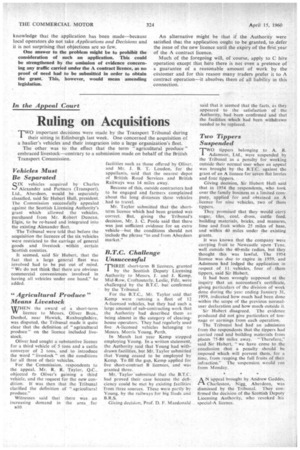In the Appeal Court
Page 44

If you've noticed an error in this article please click here to report it so we can fix it.
Ruling on Acquisitions
JWO important decisions were made by the Transport Tribunal during their sitting in Edinburgh last week. One concerned the acquisition of a haulier's vehicles and their integration into a large organization's fleet.
The other was to the effect that the term "agricultural produce" embraced livestock—contrary to a submission made on behalf of the British Transport Commission.
Vehicles Must Be Separated
SIX vehicles acquired by Charles Alexander and Partners (Transport), Ltd., Aberdeen, would be separately classified, said Sir Hubert Hull, president. The Commission successfully appealed against the Scottish Licensing Authority's grant which allowed the vehicles, purchased from Mr. Robert Duncan, Elgin, to be re-based and integrated into the existing Alexander fleet.
The Tribunal were told that before the acquisition the licences of the six vehicles were restricted to the carriage of general goods and livestock within certain Scottish counties.
It seemed, said Sir Hubert, that the fact that a large general fleet was involved had to be put out of mind, "We do not think that there are obvious commercial conveniences involved in having all vehicles under one hand," he added.
"Agricultural Produce" Means Livestock
WHEN the award of a short-term licence to Messrs. Oliver Bros., Denhol, near Hawick, Roxburghshire, was disputed, the Tribunal made it quite clear that the definition of "agricultural produce" on the licence included livestock.
Oliver had sought a substantive licence for a third vehicle of 5 tons and a cattle conveyor of 2 tons, and to introduce the word " livestock " on the conditions for all three of their vehicles.
For the Commission, respondents to the appeal, Mr. R. R. Taylor, O.C., objected to Oliver's gaining a third vehicle, and the request for the new condition. If was then that the Tribunal clarified the definition of " agricultural p rod uce."
Witnesses said that there was an increasing demand in the area for 14 10
facilities such as those offered by Oliver, and Mr. J. B. T. Loudon, for the appellants, said that the nearest depot of British Road Services and British Railways was 14 miles away.
Because of this, outside contractors had to be engaged and farmers complained about the long distances these vehicles had to travel.
Mr. Taylor submitted that the shortterm licence which had been granted was correct. But, giving the Tribunal's decision, Mr. J. C. Poole said that there was just sufficient evidence for an extra vehicle—but the conditions should not include the phrase "to and from Aberdeen market."
B.T.C. Challenge Unsuccessful
THREE short-term B licences, granted by the Scottish Deputy Licensing Authority to Messrs. J. and J. Kemp, Mid-Row, Croftouterly. Leslie, Fife, were challenged by the B.T.C. but confirmed by the Tribunal.
For the B.T.C., Mr. Taylor said that Kemp were running a fleet of 12 A-licensed vehicles, but they had such a large amount of sub-contracting work that the Authority had described them as being almost in the category of clearinghouse operators. They had regularly used five A-licensed vehicles belonging to Messrs. Morris Young, Perth.
In March last year Kemp stopped employing Young. In a written statement, the Authority said that Young had withdrawn facilities, but Mr. Taylor submitted that Young ceased to be employed by Kemp. To fill the gap, Kemp applied for five short-contract B licences, and was granted three.
Mr. 'Taylor -submitted that the B.T.C. had proved their case because the deti7 ciency could be met by existing facilities from three sources. These were partly by Young, by the railways for big roads and• B.R.S.
Giving decision, Prof. D. F. Macdonald said that it seemed that the facts, as they appeared to the satisfaction of the Authority, had been confirmed and that the facilities which had been withdrawn needed to be replaced.
Two Tippers Suspended
Tv° tippers belonging to A. R. I Adamson, Ltd., were suspended by the Tribunal as a penalty for working outside their normal user when an appeal was brought by the B.T.C. against the grant of an A licence for seven flat lorries and four tippers.
Giving decision, Sir Hubert Hull said that in 1954 the respondents, who took over the family business as a limited company, applied for and obtained an A .licence for nine vehicles, two of them tippers.
They promised that they would carry sugar, tiles, coal, dross, cattle feed, building materials, bricks, and manures, time and fruit within 25 miles of base, and within 40 miles under the existing grants.
It was known that the company were carrying fruit to Newcastle upon Tyne, well outside the 40-mile radius, but they thought this •was lawful. The 1954 licence was due to expire in 1959, and Adamson had lodged the application in respect of 11 vehicles, four of them tippers, said Sir Hubert.
It had been wrongly supposed at the inquiry that an accountant's certificate, giving particulars of the division of work done during the year ending January 31, 1959, indicated how much had been done within the scope of the previous normaluser declaration and how much outside it. -Sir Hubert disagreed. The evidence produced did not give particulars of tonnage or earnings from each operation. The Tribunal had had an admission from the respondents that the tippers had carried road and building materials from places 75-80 miles away. "Therefore," said Sir Hubert, " we have come to the conclusion that a penalty should be imposed which will prevent them, for a time, from reaping the full fruits of their infraction." The suspension would run from Monday.
AN appeal brought by Andrew Geddes, Charleston, Nigg, Aberdeen, was dismissed by the Tribunal. They confirmed the decision of the Scottish Deputy Licensing Authority, who revoked his special-A licence.




























































































